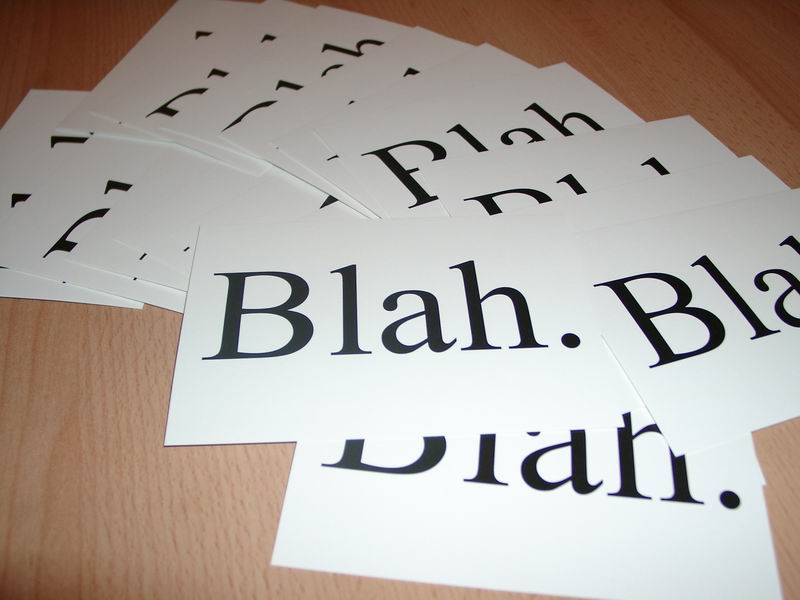
So the interim CEO of NPR (they fired the last one) has a blog. And on that blog today, he decided to share his thoughts on the Bryant Park Project. The BPP - who have done everything they can to maintain pressure on NPR to keep them alive - linked to his blog on theirs.
Here's the gist of what he said. A staffer apparently contacted him with the idea of keeping it alive as a web-only project. The short answer is "sorry, no". The long answer is some of the most bewildering business-speak I've had the misfortune to read. It's an infuriating read. Go see for yourself.
We've/I've learned -- or relearned -- a lot in the process. Sustaining a new program of this financial magnitude requires attracting users from each of the platforms we can access. In this case, radio carriage was inadequate and web/podcasting usage was hampered -- here's the relearning part -- by having an appointment program in a medium that doesn't excel in that kind of usage. Web radio is growing very rapidly (much faster than FM did, for example), but it's almost all to music and, increasingly, to attention-tracking music.All I learned from his comments were that NPR has no idea what they're doing. They wanted to launch some sort of web/radio hybrid, something for the 21st century radio listener, but they didn't seem to know what they really wanted to do. They want to succeed in the new media age, but didn't realize that the BPP was actually succeeding. They can't identify it as success because they don't know what they're hoping to achieve. Anyway, after his post appeared on the BPP blog, I responded with a fairly long comment. Here's what I wrote:Perhaps the future of news on the web is in the same user-programmed direction. I'd like to see good minds like those of the BPP staff think about how we can do good journalism delivered via the web using techniques beyond just throwing up another portal-type web site and expecting people to come to it. Our new open API release is a great tool for that. The realities of how people use the web, how web audiences grow through search, and technologies for tracking attention and tailoring content delivery to match how people spend their attention all need to be considered. Portals still have a place, just as their close cousins radio transmitters do, but we can no longer put all our eggs in that basket.
NPR will, I hope, be a leader in a new generation of news delivery over multiple platforms, including ones we've never conceived. But we can't make those 2nd generation investments if we continue 1st generation efforts that aren't consistent with what we know about how media usage is maturing.
You can't make those second-generation efforts succeed if you kill off the attempts to create "new media" before giving them a chance to succeed. I can't believe that you would cancel the BPP - a slap in the face to all associated with the project - and then ask its braintrust to come up with ideas on creating online content. They had a brilliant idea, and you've euthanized it.
You suggest that the BPP was an example of "putting all your eggs in one basket". But later in your piece, you demonstrate that you haven't put all of your eggs in one basket: you're podcasting, you've got the new NPR Music website, you've got the API, and you've got the BPP. It seemed to me that the BPP was part of a strategy - not the be-all/end-all of your new media strategy. There must be a way to keep the BPP going in some lower-cost format, since is it your most adventurous and most successful venture in 21st generation media to date.
The comparison to Morning Edition and ATC's audience - even in terms of podcasts - is unfair. Those programs have a thirty-year record, and they are essentially "destination programs." When people are trying to find NPR programs, they look for Morning Edition and All Things Considered. They don't look for News and Notes. They don't look for Tell Me More. They don't look for the BPP. This is a problem of branding and marketing, not of the BPP's quality or content. This is an external problem, not an internal one.
Despite that, the BPP built a passionate audience of a million people - on air, online, on Twitter, on Facebook, on the blog - in less than ten months. Morning Edition has an audience of thirteen million, after thirty years.
BPP is part of the long list of programs on the NPR website, but without some strategic cross-marketing, of course it's not going to succeed. Morning Edition and All Things Considered should be promoting the BPP regularly, in the way that they regularly use stories from programs like Youth Radio and other outside projects. (I can't find a single instance of a BPP story appearing on ATC. Not one.) There needs to be a strategic effort to build cross-brand interest. You don't just send a new project out there to sink or swim - it has to be nurtured and supported, or else it will inevitably fail.

No comments:
Post a Comment